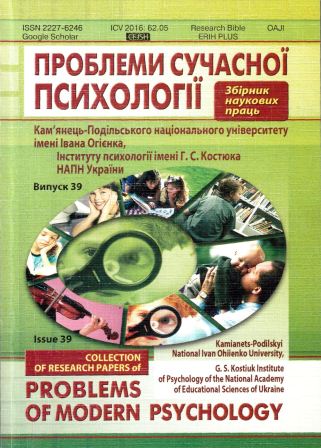Дослідження харчових виборів жінок репродуктивного віку
DOI:
https://doi.org/10.32626/2227-6246.2018-39.19-31Ключові слова:
харчовий вибір, харчова поведінка, кореляція, модель, репродуктивний вік, криза, часовий параметр.Анотація
У статті підкреслено, що харчові вибори відіграють важливу роль у соціальному, економічному та культурному аспектах життя, виражаючи те, чому людина віддає перевагу, ідентичність та культурні значення. Запропонована нами модель процесу харчового вибору має за мету зрозуміти та сполучити суттєві частини процесу, в якому люди вибирають їжу та пов’язані з нею взаємовідносини. Наголошено, що харчові вибори є динамічними та розвиваються з часом. Зроблено висновок, що життєвий шлях людини забезпечує темпоральні індивідуальні та історичні контексти для поточних харчових виборів. Люди вибирають особисті траєкторії харчових виборів, що можуть змінюватися відносно особливих криз на життєвому шляху та періодів у їх житті. Досліджувану вибірку склали 1558 жінок репродуктивного віку, які проживають в Україні. Частину вибірки склали жінки із зайвою та надмірною вагою. Середній вік досліджуваних жінок – 25,08 року, середній показник ІМТ (індексу маси тіла) – 21,96. Першим етапом роботи стало обчислення альфи Кронбаха α для методик, дані для валідності та надійності яких на українській вибірці відсутні. Другим етапом роботи став аналіз середніх значень та середньоквадратичних відхилень за різними методиками по вибірці. Третім етапом роботи став кореляційний аналіз отриманих даних. Кореляція Пірсона r = –0,413, p < 0,01 досліджена між харчовою залежністю та наполегливістю за опитувальником самоорганізації діяльності, а кореляція r = 0,387, p < 0,01 віднайдена між харчовою залежністю та часовою перспективою негативного минулого. Виявлено, що харчова залежність негативно корелює з наполегливістю та позитивно корелює з перспективою негативного минулого.
Посилання
Бацилєва О. В. Репродуктивне здоров’я: медико-психологічні та соціальні аспекти : [монографія] / О. В. Бацилєва. – Донецьк : Донбас, 2011. – 236 с.
Бессесен Д. Г. Избыточный вес и ожирение: профилактика, диагностика и лечение / Д. Г. Бессесен, Р. Кушнер. – М. : Бином, 2004. – 239 с.
Нардонэ Дж. В плену у еды: булимия, анорексия, vomiting. Краткосрочная терапия нарушений пищевого поведения / Дж. Нардонэ, Т. Вербиц, Р. Миланезе ; пер. с итал. О. Е. Игошиной – М. : Генезис, 2016. – 320 с.
Перлмуттер Д. Еда и мозг. Что углеводы делают со здоровьем, мышлением и памятью / Д. Перлмуттер. – М. : Манн, Иванов и Фербер, 2017. – 240 с.
Рамси Н. Психология внешности / Н. Рамси, Д. Харкорт. – СПб. : Питер, 2009. – 256 с.
Суэми В. Психология красоты и привлекательности / В. Суэми, А. Фернхем. – СПб. : Питер, 2009. – 240 с.
Baker R. C. Weight control during the holidays: Highly consistent self-monitoring as a potentially useful coping mechanism / R.C.Baker, D.S.Kirschenbaum // Health Psychology. – 1998. – № 17. – Р. 367–370.
Boutelle K. N. How can obese weight controllers minimize weight gain during the high risk holiday season? By self-monitoring very consistently / K. N. Boutelle, D. S. Kirschenbaum, R. C. Baker, M. E. Mitchell // Health Psychology. – 1999. – № 18. – Р. 364–368.
Kim S. Effects of lifestyle modification on metabolic parameters and carotid intima-media thickness in patients with type 2 diabetes mellitus / S. Kim, S. Lee, E. Kang, K. Hur, H. Lee, C. Ahn, B. Cha, J. Yoo, H. Lee // Metabolism. – 2006. – № 5. – Р. 1053–1059.
Kuller L. H. Women’s Healthy Lifestyle Project: A randomized clinical trial: Results at 54 months / L. H. Kuller, L. R. SimkinSilverman, R. R. Wing, E. N. Meilahn, D. G. Ives // Circulation. – 2001. – № 103. – Р. 32–37.
Paul-Ebhohimhen V. Systematic review of the use of financial incentives in treatments for obesity and overweight / V. PaulEbhohimhen, A. Avenell // Obesity Reviews. – 2007. – № 23. – Р. 1–13.
Wing R. B. Benefits of recurring participants with friends and increasing social support for weight loss and maintenance / R. B. Wing, R. W. Jeffery // Journal of Consulting and Clinical Psychology. – 1999. – № 67. – P. 132–138.
##submission.downloads##
Опубліковано
Як цитувати
Номер
Розділ
Ліцензія
Редакція має повне право публікувати у Збірнику оригінальні наукові статті як результати теоретичних і експериментальних досліджень, які не знаходяться на розгляді для опублікування в інших виданнях. Автор передає редколегії Збірника права на розповсюдження електронної версії статті, а також електронної версії англомовного перекладу статті (для статей українською та російською мовою) через будь-які електронні засоби (розміщення на офіційному web-сайті Збірника, в електронних базах даних, репозитаріях та ін).
Автор публікації зберігає за собою право без узгодження з редколегією та засновниками використовувати матеріали статті: а) частково чи повністю в освітніх цілях; б) для написання власних дисертацій; в) для підготовки абстрактів, доповідей конференцій та презентацій.
Автор публікації має право розміщувати електронні копії статті (у тому числі кінцеву електронну версію, завантажену з офіційного web-сайту Збірника) на:
- персональних web-ресурсах усіх Авторів (web-сайти, web-сторінки, блоги тощо);
- web-ресурсах установ, де працюють Автори (включно з електронними інституційними репозитаріями);
- некомерційних web-ресурсах відкритого доступу (наприклад, arXiv.org).
Але в усіх випадках обов’язковою є наявність бібліографічного посилання на статтю або гіперпосилання на її електронну копію, що містяться на офіційному сайті Збірника.






